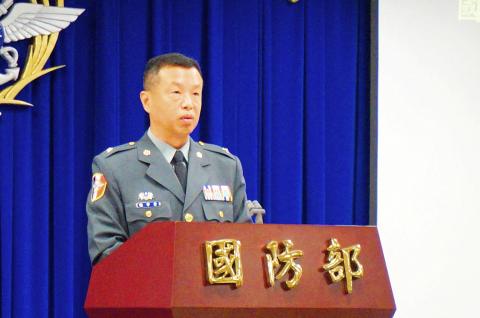The annual Han Kuang exercises are to begin next month with live-fire, anti-landing exercises in outlying Penghu County, while the military is to simulate for the first time the combat capability of US-made F-35 jets in a cross-strait conflict scenario.
Like previous Hang Kuang exercises, this year’s consist of two parts — a computer simulation of an attack by China’s People’s Liberation Army (PLA), followed by nationwide field exercises to test the results of the simulation, the Ministry of National Defense said yesterday.
The first-stage simulation is to be conducted from May 1 to May 5 to simulate a PLA attack on Taiwan to test the military’s capabilities in countering landing operations and a naval blockade, as well as the ability to collect intelligence and preserve key military facilities and weaponry.

Photo: Tu Chu-min, Taipei Times
“The simulation will be conducted factoring in China’s military buildup, with three aircraft carriers, stealth fighter jets and new missiles to enter service by 2025,” said Lieutenant General Chiang Chen-chung (姜振中), director of the ministry’s Office for Operations and Planning.
“We will test two defense strategies. The first is conditioned on the acquisition of F-35 jets and the second without F-35s,” Chiang said.
Lockheed Martin F-35s are a desired procurement of the military, as their short takeoff and vertical landing capabilities, as well as their advanced stealth features, would allow the air force to retain combat capacity should air bases be destroyed.
It is to be the first time that F-35s are a factor in the exercises.
“In case we do not acquire F-35s, we are in the process of upgrading F-16s, Mirage 2000s and Indigenous Defense Fighters (IDF), as well as developing new weapons. The simulation will be based on realistic analysis, instead of fictitious war scenarios,” Chiang said.
The second-stage field exercises are to be held from May 22 to May 26, with a large-scale, live-fire drill to be conducted in Penghu.
The Marine Corps are to initiate a landing operation to simulate a PLA attack and test defensive troops’ ability to protect critical facilities and strategic positions. The armed forces will then launch a joint operation to retake the Penghu archipelago.
Units and weapons to be engaged during the field exercises include Cheng Kung-class frigates, Chinchiang-class corvettes, Tuo Jiang-class corvettes, F-16 jets, IDF jets, AH-64E Apaches, AH-1H Super Cobras, RT2000 Artillery Multiple Launch Rocket systems, M60A3 tanks and light weapons.
President Tsai Ing-wen (蔡英文) is expected to supervise the exercises, ministry spokesman Major General Chen Chung-chi (陳中吉) said.

A preclearance service to facilitate entry for people traveling to select airports in Japan would be available from Thursday next week to Feb. 25 at Taiwan Taoyuan International Airport, Taoyuan International Airport Corp (TIAC) said on Tuesday. The service was first made available to Taiwanese travelers throughout the winter vacation of 2024 and during the Lunar New Year holiday. In addition to flights to the Japanese cities of Hakodate, Asahikawa, Akita, Sendai, Niigata, Okayama, Takamatsu, Kumamoto and Kagoshima, the service would be available to travelers to Kobe and Oita. The service can be accessed by passengers of 15 flight routes operated by

Alain Robert, known as the "French Spider-Man," praised Alex Honnold as exceptionally well-prepared after the US climber completed a free solo ascent of Taipei 101 yesterday. Robert said Honnold's ascent of the 508m-tall skyscraper in just more than one-and-a-half hours without using safety ropes or equipment was a remarkable achievement. "This is my life," he said in an interview conducted in French, adding that he liked the feeling of being "on the edge of danger." The 63-year-old Frenchman climbed Taipei 101 using ropes in December 2004, taking about four hours to reach the top. On a one-to-10 scale of difficulty, Robert said Taipei 101

MORE FALL: An investigation into one of Xi’s key cronies, part of a broader ‘anti-corruption’ drive, indicates that he might have a deep distrust in the military, an expert said China’s latest military purge underscores systemic risks in its shift from collective leadership to sole rule under Chinese President Xi Jinping (習近平), and could disrupt its chain of command and military capabilities, a national security official said yesterday. If decisionmaking within the Chinese Communist Party has become “irrational” under one-man rule, the Taiwan Strait and the regional situation must be approached with extreme caution, given unforeseen risks, they added. The anonymous official made the remarks as China’s Central Military Commission Vice Chairman Zhang Youxia (張又俠) and Joint Staff Department Chief of Staff Liu Zhenli (劉振立) were reportedly being investigated for suspected “serious

Taiwanese and US defense groups are collaborating to introduce deployable, semi-autonomous manufacturing systems for drones and components in a boost to the nation’s supply chain resilience. Taiwan’s G-Tech Optroelectronics Corp subsidiary GTOC and the US’ Aerkomm Inc on Friday announced an agreement with fellow US-based Firestorm Lab to adopt the latter’s xCell, a technology featuring 3D printers fitted in 6.1m container units. The systems enable aerial platforms and parts to be produced in high volumes from dispersed nodes capable of rapid redeployment, to minimize the risk of enemy strikes and to meet field requirements, they said. Firestorm chief technology officer Ian Muceus said